MGNT351 - Analysis of Nelson Mandela's Leadership in Invictus
VerifiedAdded on 2023/06/10
|8
|2471
|484
Essay
AI Summary
This essay analyzes the leadership portrayed in the film "Invictus," focusing on Nelson Mandela's actions in post-apartheid South Africa. It examines his leadership style, highlighting his ability to unite a divided nation through sports and reconciliation. The essay discusses the responsible leadership theory, emphasizing Mandela's extraverted traits, integrity, and relational intelligence. It explores how Mandela challenged processes, built trust, and demonstrated ethical and emotional intelligence. The analysis also covers his strategic use of forgiveness and his commitment to overcoming racial divisions. The essay concludes by reflecting on Mandela's Christ-like leadership, his ability to inspire, and his role in fostering unity and goodwill within the country. The paper references key leadership concepts and theories, as well as the context of the film and Nelson Mandela's historical actions.
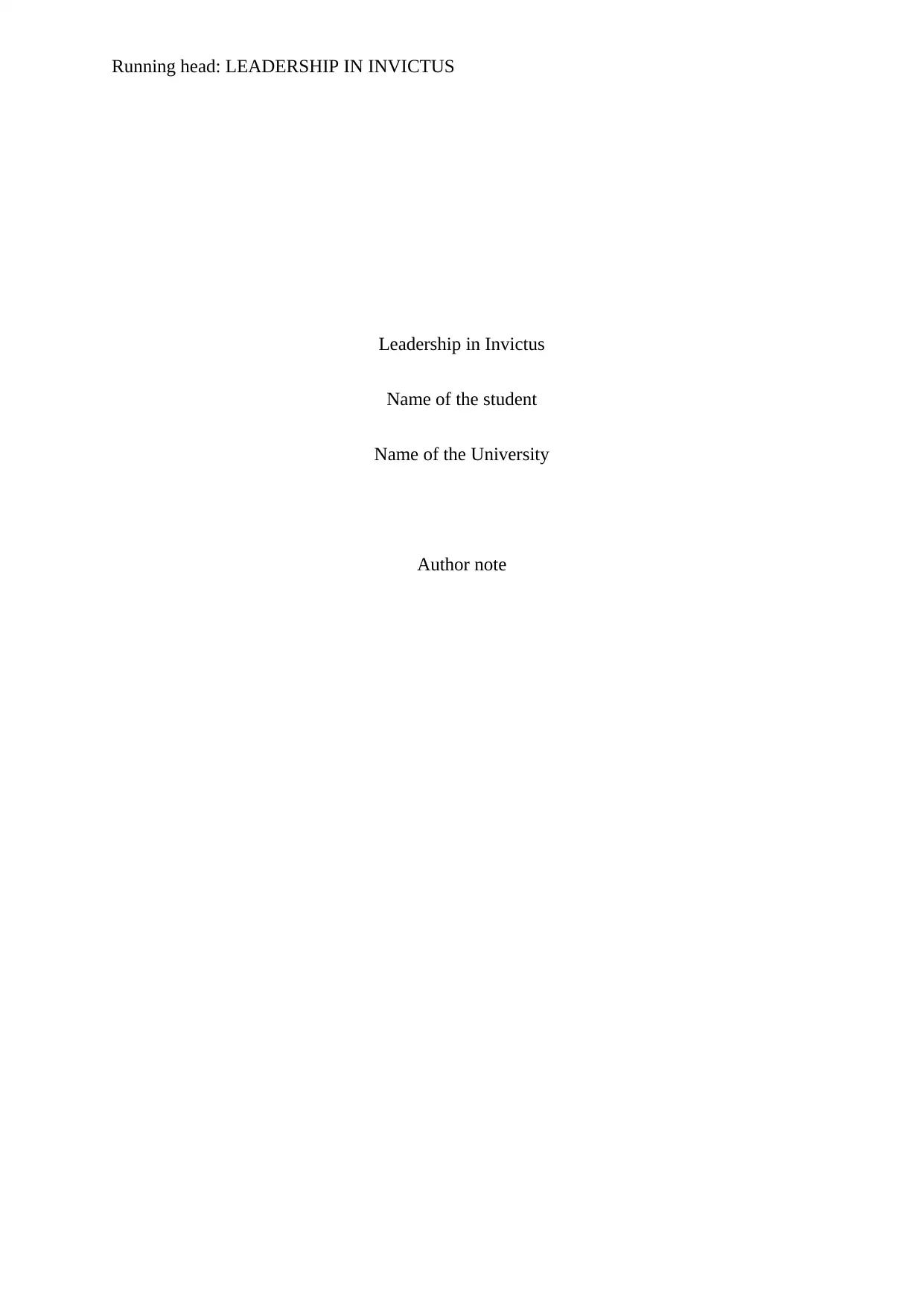
Running head: LEADERSHIP IN INVICTUS
Leadership in Invictus
Name of the student
Name of the University
Author note
Leadership in Invictus
Name of the student
Name of the University
Author note
Paraphrase This Document
Need a fresh take? Get an instant paraphrase of this document with our AI Paraphraser
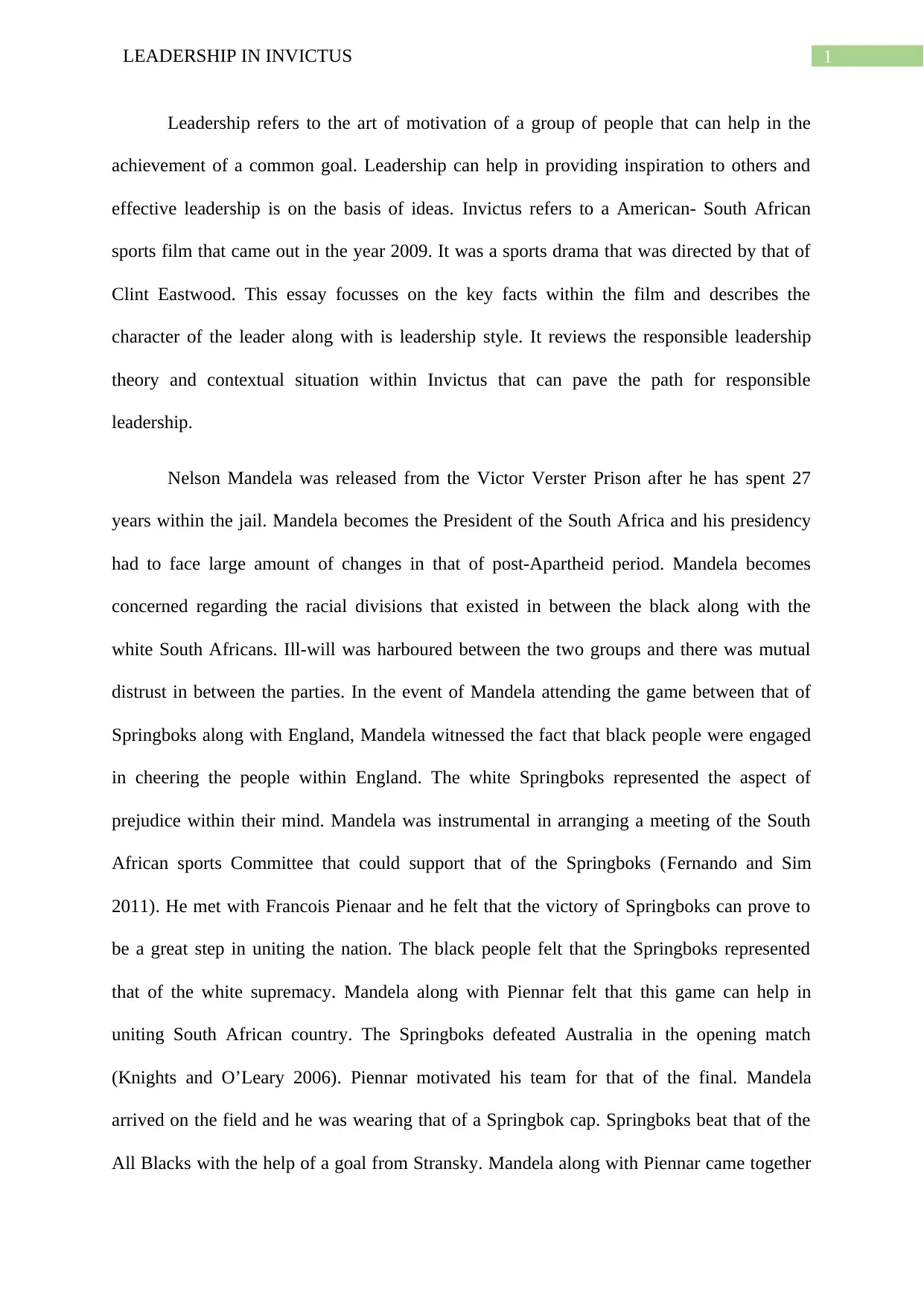
1LEADERSHIP IN INVICTUS
Leadership refers to the art of motivation of a group of people that can help in the
achievement of a common goal. Leadership can help in providing inspiration to others and
effective leadership is on the basis of ideas. Invictus refers to a American- South African
sports film that came out in the year 2009. It was a sports drama that was directed by that of
Clint Eastwood. This essay focusses on the key facts within the film and describes the
character of the leader along with is leadership style. It reviews the responsible leadership
theory and contextual situation within Invictus that can pave the path for responsible
leadership.
Nelson Mandela was released from the Victor Verster Prison after he has spent 27
years within the jail. Mandela becomes the President of the South Africa and his presidency
had to face large amount of changes in that of post-Apartheid period. Mandela becomes
concerned regarding the racial divisions that existed in between the black along with the
white South Africans. Ill-will was harboured between the two groups and there was mutual
distrust in between the parties. In the event of Mandela attending the game between that of
Springboks along with England, Mandela witnessed the fact that black people were engaged
in cheering the people within England. The white Springboks represented the aspect of
prejudice within their mind. Mandela was instrumental in arranging a meeting of the South
African sports Committee that could support that of the Springboks (Fernando and Sim
2011). He met with Francois Pienaar and he felt that the victory of Springboks can prove to
be a great step in uniting the nation. The black people felt that the Springboks represented
that of the white supremacy. Mandela along with Piennar felt that this game can help in
uniting South African country. The Springboks defeated Australia in the opening match
(Knights and O’Leary 2006). Piennar motivated his team for that of the final. Mandela
arrived on the field and he was wearing that of a Springbok cap. Springboks beat that of the
All Blacks with the help of a goal from Stransky. Mandela along with Piennar came together
Leadership refers to the art of motivation of a group of people that can help in the
achievement of a common goal. Leadership can help in providing inspiration to others and
effective leadership is on the basis of ideas. Invictus refers to a American- South African
sports film that came out in the year 2009. It was a sports drama that was directed by that of
Clint Eastwood. This essay focusses on the key facts within the film and describes the
character of the leader along with is leadership style. It reviews the responsible leadership
theory and contextual situation within Invictus that can pave the path for responsible
leadership.
Nelson Mandela was released from the Victor Verster Prison after he has spent 27
years within the jail. Mandela becomes the President of the South Africa and his presidency
had to face large amount of changes in that of post-Apartheid period. Mandela becomes
concerned regarding the racial divisions that existed in between the black along with the
white South Africans. Ill-will was harboured between the two groups and there was mutual
distrust in between the parties. In the event of Mandela attending the game between that of
Springboks along with England, Mandela witnessed the fact that black people were engaged
in cheering the people within England. The white Springboks represented the aspect of
prejudice within their mind. Mandela was instrumental in arranging a meeting of the South
African sports Committee that could support that of the Springboks (Fernando and Sim
2011). He met with Francois Pienaar and he felt that the victory of Springboks can prove to
be a great step in uniting the nation. The black people felt that the Springboks represented
that of the white supremacy. Mandela along with Piennar felt that this game can help in
uniting South African country. The Springboks defeated Australia in the opening match
(Knights and O’Leary 2006). Piennar motivated his team for that of the final. Mandela
arrived on the field and he was wearing that of a Springbok cap. Springboks beat that of the
All Blacks with the help of a goal from Stransky. Mandela along with Piennar came together
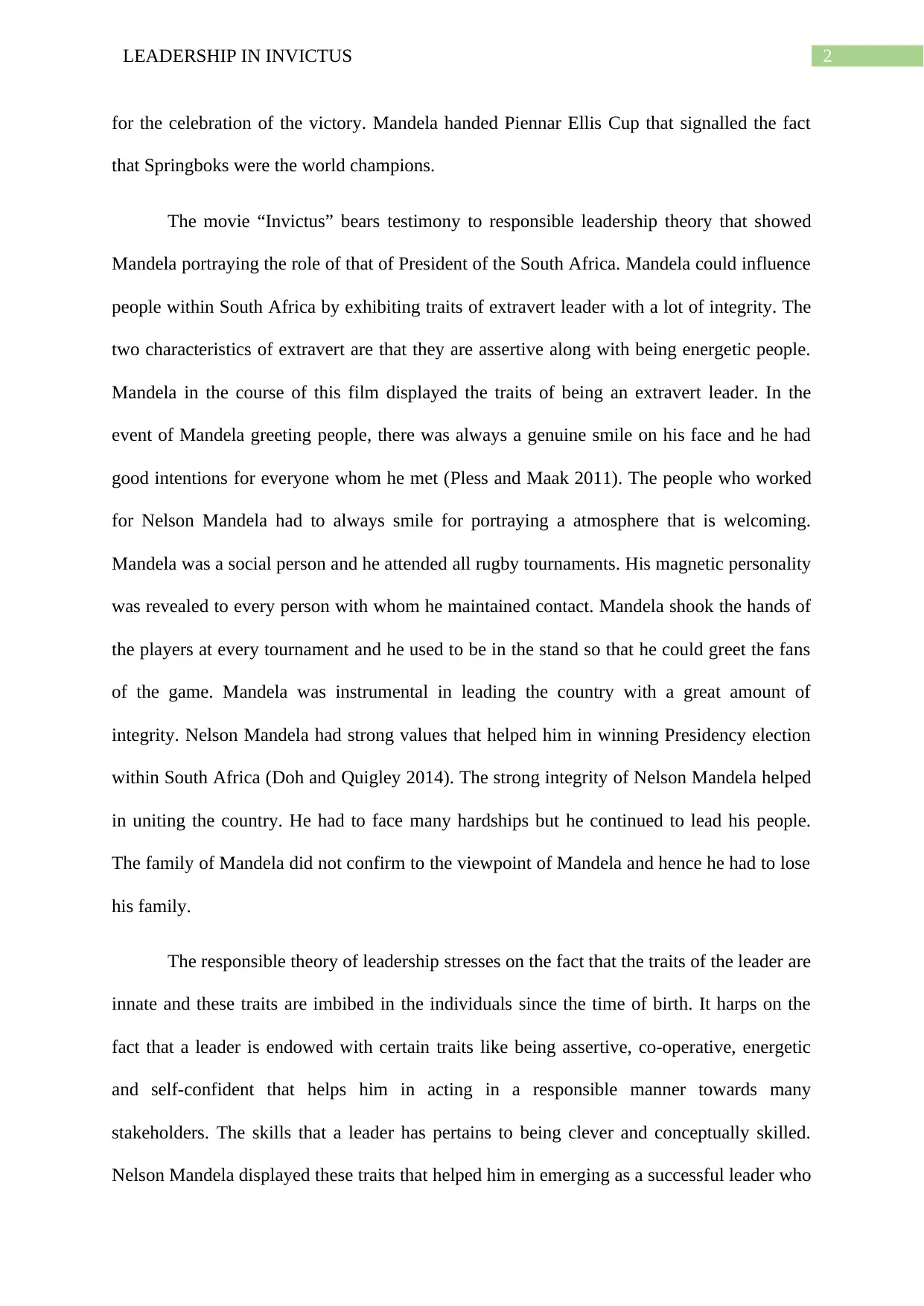
2LEADERSHIP IN INVICTUS
for the celebration of the victory. Mandela handed Piennar Ellis Cup that signalled the fact
that Springboks were the world champions.
The movie “Invictus” bears testimony to responsible leadership theory that showed
Mandela portraying the role of that of President of the South Africa. Mandela could influence
people within South Africa by exhibiting traits of extravert leader with a lot of integrity. The
two characteristics of extravert are that they are assertive along with being energetic people.
Mandela in the course of this film displayed the traits of being an extravert leader. In the
event of Mandela greeting people, there was always a genuine smile on his face and he had
good intentions for everyone whom he met (Pless and Maak 2011). The people who worked
for Nelson Mandela had to always smile for portraying a atmosphere that is welcoming.
Mandela was a social person and he attended all rugby tournaments. His magnetic personality
was revealed to every person with whom he maintained contact. Mandela shook the hands of
the players at every tournament and he used to be in the stand so that he could greet the fans
of the game. Mandela was instrumental in leading the country with a great amount of
integrity. Nelson Mandela had strong values that helped him in winning Presidency election
within South Africa (Doh and Quigley 2014). The strong integrity of Nelson Mandela helped
in uniting the country. He had to face many hardships but he continued to lead his people.
The family of Mandela did not confirm to the viewpoint of Mandela and hence he had to lose
his family.
The responsible theory of leadership stresses on the fact that the traits of the leader are
innate and these traits are imbibed in the individuals since the time of birth. It harps on the
fact that a leader is endowed with certain traits like being assertive, co-operative, energetic
and self-confident that helps him in acting in a responsible manner towards many
stakeholders. The skills that a leader has pertains to being clever and conceptually skilled.
Nelson Mandela displayed these traits that helped him in emerging as a successful leader who
for the celebration of the victory. Mandela handed Piennar Ellis Cup that signalled the fact
that Springboks were the world champions.
The movie “Invictus” bears testimony to responsible leadership theory that showed
Mandela portraying the role of that of President of the South Africa. Mandela could influence
people within South Africa by exhibiting traits of extravert leader with a lot of integrity. The
two characteristics of extravert are that they are assertive along with being energetic people.
Mandela in the course of this film displayed the traits of being an extravert leader. In the
event of Mandela greeting people, there was always a genuine smile on his face and he had
good intentions for everyone whom he met (Pless and Maak 2011). The people who worked
for Nelson Mandela had to always smile for portraying a atmosphere that is welcoming.
Mandela was a social person and he attended all rugby tournaments. His magnetic personality
was revealed to every person with whom he maintained contact. Mandela shook the hands of
the players at every tournament and he used to be in the stand so that he could greet the fans
of the game. Mandela was instrumental in leading the country with a great amount of
integrity. Nelson Mandela had strong values that helped him in winning Presidency election
within South Africa (Doh and Quigley 2014). The strong integrity of Nelson Mandela helped
in uniting the country. He had to face many hardships but he continued to lead his people.
The family of Mandela did not confirm to the viewpoint of Mandela and hence he had to lose
his family.
The responsible theory of leadership stresses on the fact that the traits of the leader are
innate and these traits are imbibed in the individuals since the time of birth. It harps on the
fact that a leader is endowed with certain traits like being assertive, co-operative, energetic
and self-confident that helps him in acting in a responsible manner towards many
stakeholders. The skills that a leader has pertains to being clever and conceptually skilled.
Nelson Mandela displayed these traits that helped him in emerging as a successful leader who
⊘ This is a preview!⊘
Do you want full access?
Subscribe today to unlock all pages.

Trusted by 1+ million students worldwide
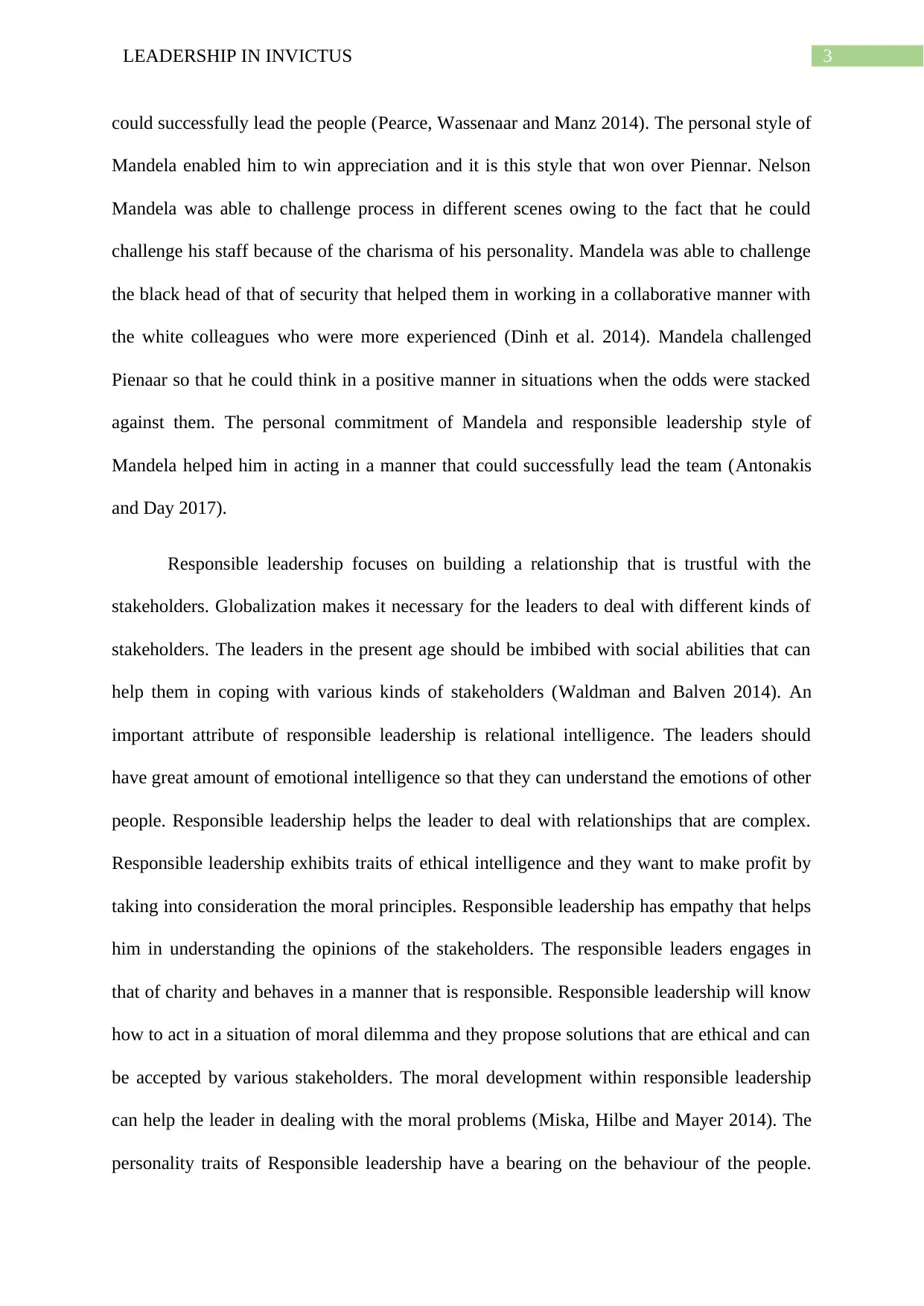
3LEADERSHIP IN INVICTUS
could successfully lead the people (Pearce, Wassenaar and Manz 2014). The personal style of
Mandela enabled him to win appreciation and it is this style that won over Piennar. Nelson
Mandela was able to challenge process in different scenes owing to the fact that he could
challenge his staff because of the charisma of his personality. Mandela was able to challenge
the black head of that of security that helped them in working in a collaborative manner with
the white colleagues who were more experienced (Dinh et al. 2014). Mandela challenged
Pienaar so that he could think in a positive manner in situations when the odds were stacked
against them. The personal commitment of Mandela and responsible leadership style of
Mandela helped him in acting in a manner that could successfully lead the team (Antonakis
and Day 2017).
Responsible leadership focuses on building a relationship that is trustful with the
stakeholders. Globalization makes it necessary for the leaders to deal with different kinds of
stakeholders. The leaders in the present age should be imbibed with social abilities that can
help them in coping with various kinds of stakeholders (Waldman and Balven 2014). An
important attribute of responsible leadership is relational intelligence. The leaders should
have great amount of emotional intelligence so that they can understand the emotions of other
people. Responsible leadership helps the leader to deal with relationships that are complex.
Responsible leadership exhibits traits of ethical intelligence and they want to make profit by
taking into consideration the moral principles. Responsible leadership has empathy that helps
him in understanding the opinions of the stakeholders. The responsible leaders engages in
that of charity and behaves in a manner that is responsible. Responsible leadership will know
how to act in a situation of moral dilemma and they propose solutions that are ethical and can
be accepted by various stakeholders. The moral development within responsible leadership
can help the leader in dealing with the moral problems (Miska, Hilbe and Mayer 2014). The
personality traits of Responsible leadership have a bearing on the behaviour of the people.
could successfully lead the people (Pearce, Wassenaar and Manz 2014). The personal style of
Mandela enabled him to win appreciation and it is this style that won over Piennar. Nelson
Mandela was able to challenge process in different scenes owing to the fact that he could
challenge his staff because of the charisma of his personality. Mandela was able to challenge
the black head of that of security that helped them in working in a collaborative manner with
the white colleagues who were more experienced (Dinh et al. 2014). Mandela challenged
Pienaar so that he could think in a positive manner in situations when the odds were stacked
against them. The personal commitment of Mandela and responsible leadership style of
Mandela helped him in acting in a manner that could successfully lead the team (Antonakis
and Day 2017).
Responsible leadership focuses on building a relationship that is trustful with the
stakeholders. Globalization makes it necessary for the leaders to deal with different kinds of
stakeholders. The leaders in the present age should be imbibed with social abilities that can
help them in coping with various kinds of stakeholders (Waldman and Balven 2014). An
important attribute of responsible leadership is relational intelligence. The leaders should
have great amount of emotional intelligence so that they can understand the emotions of other
people. Responsible leadership helps the leader to deal with relationships that are complex.
Responsible leadership exhibits traits of ethical intelligence and they want to make profit by
taking into consideration the moral principles. Responsible leadership has empathy that helps
him in understanding the opinions of the stakeholders. The responsible leaders engages in
that of charity and behaves in a manner that is responsible. Responsible leadership will know
how to act in a situation of moral dilemma and they propose solutions that are ethical and can
be accepted by various stakeholders. The moral development within responsible leadership
can help the leader in dealing with the moral problems (Miska, Hilbe and Mayer 2014). The
personality traits of Responsible leadership have a bearing on the behaviour of the people.
Paraphrase This Document
Need a fresh take? Get an instant paraphrase of this document with our AI Paraphraser
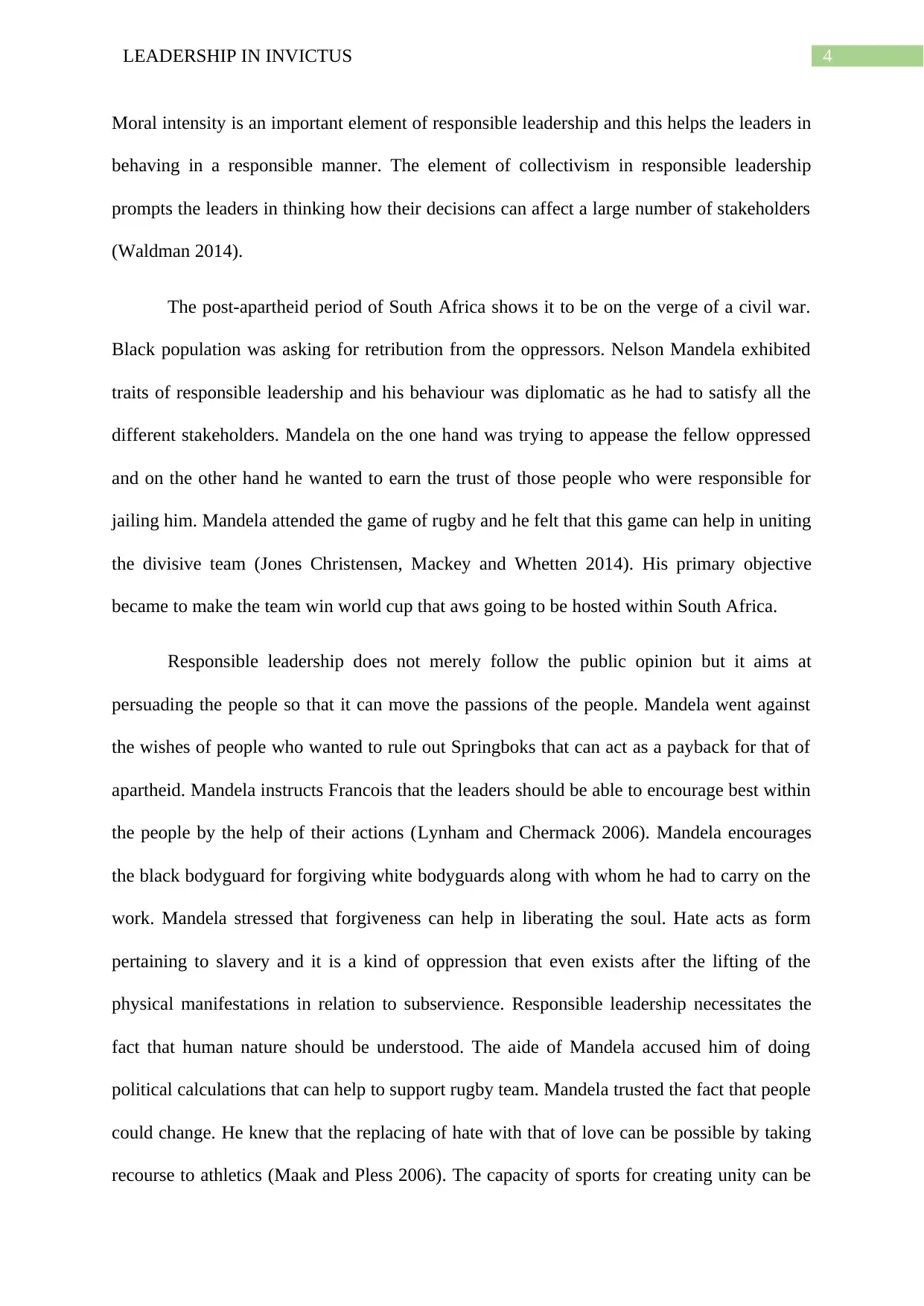
4LEADERSHIP IN INVICTUS
Moral intensity is an important element of responsible leadership and this helps the leaders in
behaving in a responsible manner. The element of collectivism in responsible leadership
prompts the leaders in thinking how their decisions can affect a large number of stakeholders
(Waldman 2014).
The post-apartheid period of South Africa shows it to be on the verge of a civil war.
Black population was asking for retribution from the oppressors. Nelson Mandela exhibited
traits of responsible leadership and his behaviour was diplomatic as he had to satisfy all the
different stakeholders. Mandela on the one hand was trying to appease the fellow oppressed
and on the other hand he wanted to earn the trust of those people who were responsible for
jailing him. Mandela attended the game of rugby and he felt that this game can help in uniting
the divisive team (Jones Christensen, Mackey and Whetten 2014). His primary objective
became to make the team win world cup that aws going to be hosted within South Africa.
Responsible leadership does not merely follow the public opinion but it aims at
persuading the people so that it can move the passions of the people. Mandela went against
the wishes of people who wanted to rule out Springboks that can act as a payback for that of
apartheid. Mandela instructs Francois that the leaders should be able to encourage best within
the people by the help of their actions (Lynham and Chermack 2006). Mandela encourages
the black bodyguard for forgiving white bodyguards along with whom he had to carry on the
work. Mandela stressed that forgiveness can help in liberating the soul. Hate acts as form
pertaining to slavery and it is a kind of oppression that even exists after the lifting of the
physical manifestations in relation to subservience. Responsible leadership necessitates the
fact that human nature should be understood. The aide of Mandela accused him of doing
political calculations that can help to support rugby team. Mandela trusted the fact that people
could change. He knew that the replacing of hate with that of love can be possible by taking
recourse to athletics (Maak and Pless 2006). The capacity of sports for creating unity can be
Moral intensity is an important element of responsible leadership and this helps the leaders in
behaving in a responsible manner. The element of collectivism in responsible leadership
prompts the leaders in thinking how their decisions can affect a large number of stakeholders
(Waldman 2014).
The post-apartheid period of South Africa shows it to be on the verge of a civil war.
Black population was asking for retribution from the oppressors. Nelson Mandela exhibited
traits of responsible leadership and his behaviour was diplomatic as he had to satisfy all the
different stakeholders. Mandela on the one hand was trying to appease the fellow oppressed
and on the other hand he wanted to earn the trust of those people who were responsible for
jailing him. Mandela attended the game of rugby and he felt that this game can help in uniting
the divisive team (Jones Christensen, Mackey and Whetten 2014). His primary objective
became to make the team win world cup that aws going to be hosted within South Africa.
Responsible leadership does not merely follow the public opinion but it aims at
persuading the people so that it can move the passions of the people. Mandela went against
the wishes of people who wanted to rule out Springboks that can act as a payback for that of
apartheid. Mandela instructs Francois that the leaders should be able to encourage best within
the people by the help of their actions (Lynham and Chermack 2006). Mandela encourages
the black bodyguard for forgiving white bodyguards along with whom he had to carry on the
work. Mandela stressed that forgiveness can help in liberating the soul. Hate acts as form
pertaining to slavery and it is a kind of oppression that even exists after the lifting of the
physical manifestations in relation to subservience. Responsible leadership necessitates the
fact that human nature should be understood. The aide of Mandela accused him of doing
political calculations that can help to support rugby team. Mandela trusted the fact that people
could change. He knew that the replacing of hate with that of love can be possible by taking
recourse to athletics (Maak and Pless 2006). The capacity of sports for creating unity can be
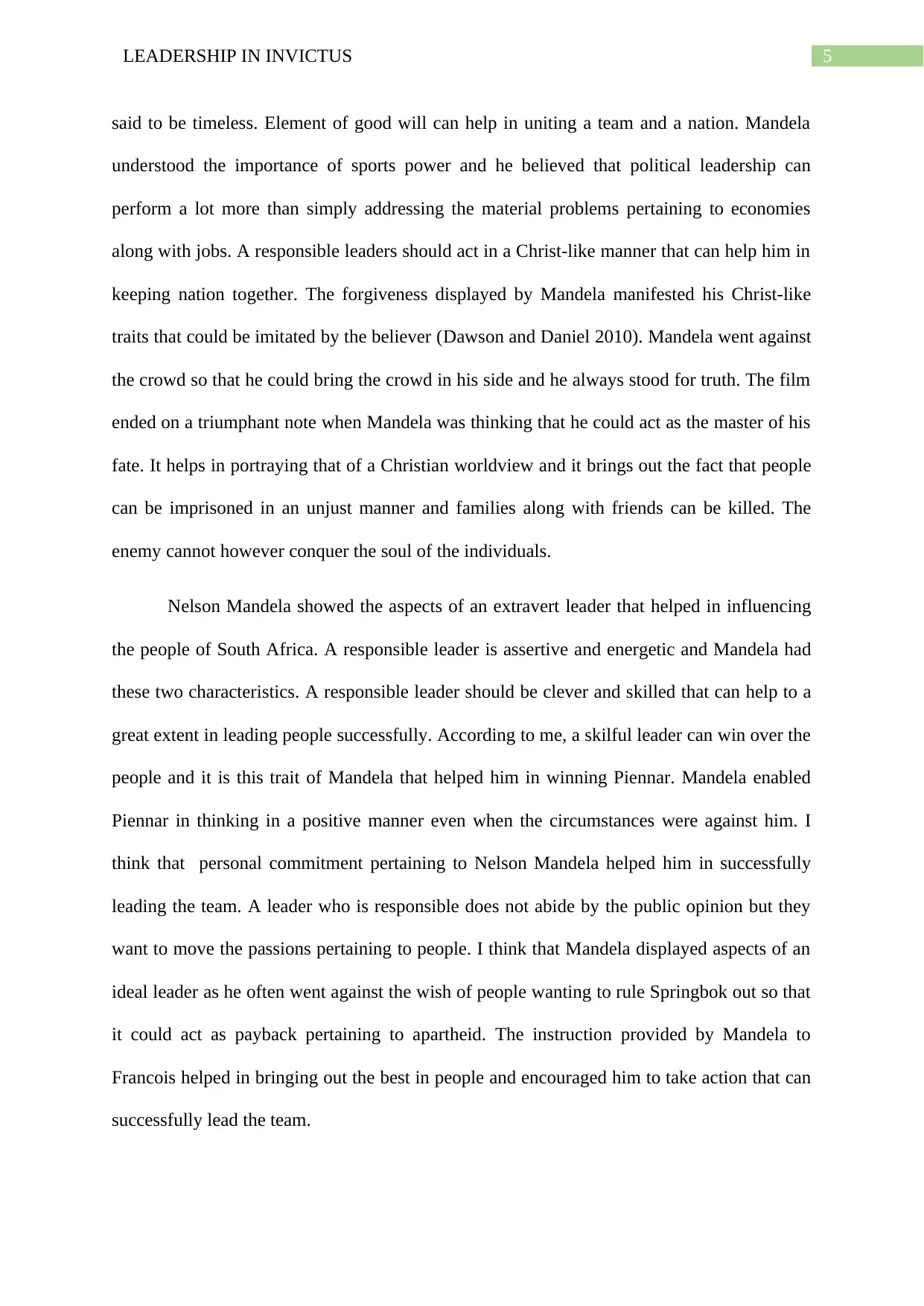
5LEADERSHIP IN INVICTUS
said to be timeless. Element of good will can help in uniting a team and a nation. Mandela
understood the importance of sports power and he believed that political leadership can
perform a lot more than simply addressing the material problems pertaining to economies
along with jobs. A responsible leaders should act in a Christ-like manner that can help him in
keeping nation together. The forgiveness displayed by Mandela manifested his Christ-like
traits that could be imitated by the believer (Dawson and Daniel 2010). Mandela went against
the crowd so that he could bring the crowd in his side and he always stood for truth. The film
ended on a triumphant note when Mandela was thinking that he could act as the master of his
fate. It helps in portraying that of a Christian worldview and it brings out the fact that people
can be imprisoned in an unjust manner and families along with friends can be killed. The
enemy cannot however conquer the soul of the individuals.
Nelson Mandela showed the aspects of an extravert leader that helped in influencing
the people of South Africa. A responsible leader is assertive and energetic and Mandela had
these two characteristics. A responsible leader should be clever and skilled that can help to a
great extent in leading people successfully. According to me, a skilful leader can win over the
people and it is this trait of Mandela that helped him in winning Piennar. Mandela enabled
Piennar in thinking in a positive manner even when the circumstances were against him. I
think that personal commitment pertaining to Nelson Mandela helped him in successfully
leading the team. A leader who is responsible does not abide by the public opinion but they
want to move the passions pertaining to people. I think that Mandela displayed aspects of an
ideal leader as he often went against the wish of people wanting to rule Springbok out so that
it could act as payback pertaining to apartheid. The instruction provided by Mandela to
Francois helped in bringing out the best in people and encouraged him to take action that can
successfully lead the team.
said to be timeless. Element of good will can help in uniting a team and a nation. Mandela
understood the importance of sports power and he believed that political leadership can
perform a lot more than simply addressing the material problems pertaining to economies
along with jobs. A responsible leaders should act in a Christ-like manner that can help him in
keeping nation together. The forgiveness displayed by Mandela manifested his Christ-like
traits that could be imitated by the believer (Dawson and Daniel 2010). Mandela went against
the crowd so that he could bring the crowd in his side and he always stood for truth. The film
ended on a triumphant note when Mandela was thinking that he could act as the master of his
fate. It helps in portraying that of a Christian worldview and it brings out the fact that people
can be imprisoned in an unjust manner and families along with friends can be killed. The
enemy cannot however conquer the soul of the individuals.
Nelson Mandela showed the aspects of an extravert leader that helped in influencing
the people of South Africa. A responsible leader is assertive and energetic and Mandela had
these two characteristics. A responsible leader should be clever and skilled that can help to a
great extent in leading people successfully. According to me, a skilful leader can win over the
people and it is this trait of Mandela that helped him in winning Piennar. Mandela enabled
Piennar in thinking in a positive manner even when the circumstances were against him. I
think that personal commitment pertaining to Nelson Mandela helped him in successfully
leading the team. A leader who is responsible does not abide by the public opinion but they
want to move the passions pertaining to people. I think that Mandela displayed aspects of an
ideal leader as he often went against the wish of people wanting to rule Springbok out so that
it could act as payback pertaining to apartheid. The instruction provided by Mandela to
Francois helped in bringing out the best in people and encouraged him to take action that can
successfully lead the team.
⊘ This is a preview!⊘
Do you want full access?
Subscribe today to unlock all pages.

Trusted by 1+ million students worldwide
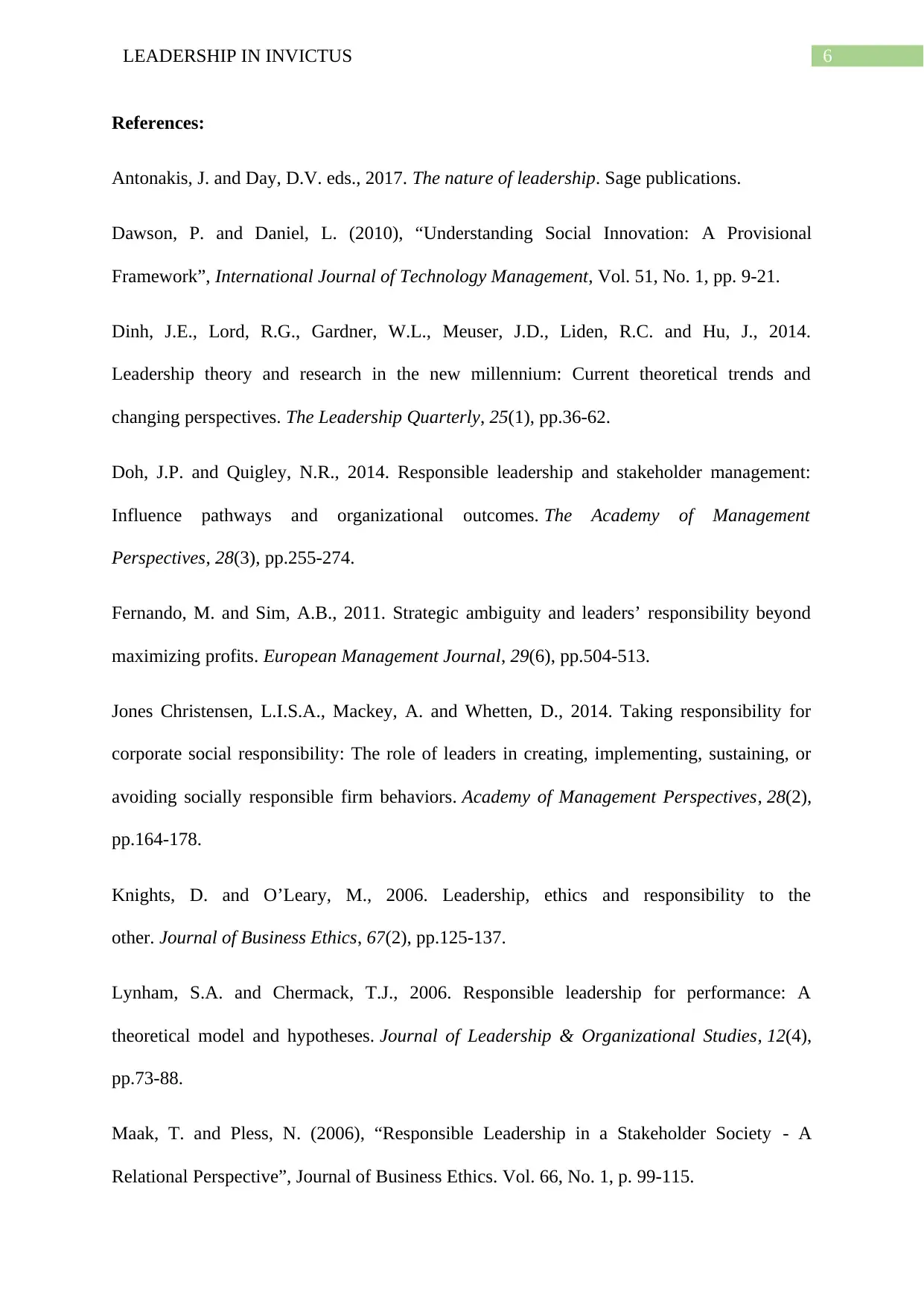
6LEADERSHIP IN INVICTUS
References:
Antonakis, J. and Day, D.V. eds., 2017. The nature of leadership. Sage publications.
Dawson, P. and Daniel, L. (2010), “Understanding Social Innovation: A Provisional
Framework”, International Journal of Technology Management, Vol. 51, No. 1, pp. 9-21.
Dinh, J.E., Lord, R.G., Gardner, W.L., Meuser, J.D., Liden, R.C. and Hu, J., 2014.
Leadership theory and research in the new millennium: Current theoretical trends and
changing perspectives. The Leadership Quarterly, 25(1), pp.36-62.
Doh, J.P. and Quigley, N.R., 2014. Responsible leadership and stakeholder management:
Influence pathways and organizational outcomes. The Academy of Management
Perspectives, 28(3), pp.255-274.
Fernando, M. and Sim, A.B., 2011. Strategic ambiguity and leaders’ responsibility beyond
maximizing profits. European Management Journal, 29(6), pp.504-513.
Jones Christensen, L.I.S.A., Mackey, A. and Whetten, D., 2014. Taking responsibility for
corporate social responsibility: The role of leaders in creating, implementing, sustaining, or
avoiding socially responsible firm behaviors. Academy of Management Perspectives, 28(2),
pp.164-178.
Knights, D. and O’Leary, M., 2006. Leadership, ethics and responsibility to the
other. Journal of Business Ethics, 67(2), pp.125-137.
Lynham, S.A. and Chermack, T.J., 2006. Responsible leadership for performance: A
theoretical model and hypotheses. Journal of Leadership & Organizational Studies, 12(4),
pp.73-88.
Maak, T. and Pless, N. (2006), “Responsible Leadership in a Stakeholder Society - A
Relational Perspective”, Journal of Business Ethics. Vol. 66, No. 1, p. 99-115.
References:
Antonakis, J. and Day, D.V. eds., 2017. The nature of leadership. Sage publications.
Dawson, P. and Daniel, L. (2010), “Understanding Social Innovation: A Provisional
Framework”, International Journal of Technology Management, Vol. 51, No. 1, pp. 9-21.
Dinh, J.E., Lord, R.G., Gardner, W.L., Meuser, J.D., Liden, R.C. and Hu, J., 2014.
Leadership theory and research in the new millennium: Current theoretical trends and
changing perspectives. The Leadership Quarterly, 25(1), pp.36-62.
Doh, J.P. and Quigley, N.R., 2014. Responsible leadership and stakeholder management:
Influence pathways and organizational outcomes. The Academy of Management
Perspectives, 28(3), pp.255-274.
Fernando, M. and Sim, A.B., 2011. Strategic ambiguity and leaders’ responsibility beyond
maximizing profits. European Management Journal, 29(6), pp.504-513.
Jones Christensen, L.I.S.A., Mackey, A. and Whetten, D., 2014. Taking responsibility for
corporate social responsibility: The role of leaders in creating, implementing, sustaining, or
avoiding socially responsible firm behaviors. Academy of Management Perspectives, 28(2),
pp.164-178.
Knights, D. and O’Leary, M., 2006. Leadership, ethics and responsibility to the
other. Journal of Business Ethics, 67(2), pp.125-137.
Lynham, S.A. and Chermack, T.J., 2006. Responsible leadership for performance: A
theoretical model and hypotheses. Journal of Leadership & Organizational Studies, 12(4),
pp.73-88.
Maak, T. and Pless, N. (2006), “Responsible Leadership in a Stakeholder Society - A
Relational Perspective”, Journal of Business Ethics. Vol. 66, No. 1, p. 99-115.
Paraphrase This Document
Need a fresh take? Get an instant paraphrase of this document with our AI Paraphraser
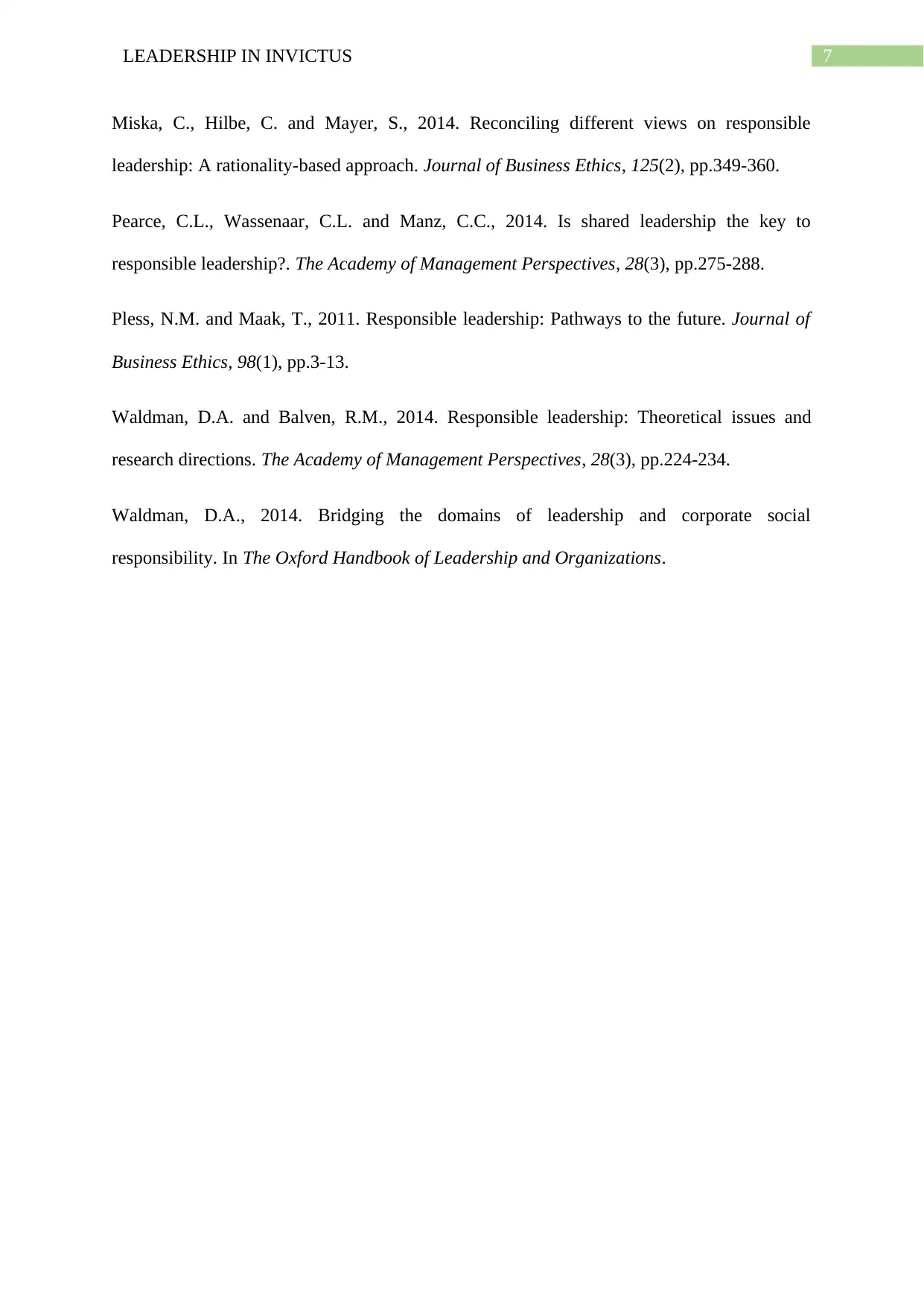
7LEADERSHIP IN INVICTUS
Miska, C., Hilbe, C. and Mayer, S., 2014. Reconciling different views on responsible
leadership: A rationality-based approach. Journal of Business Ethics, 125(2), pp.349-360.
Pearce, C.L., Wassenaar, C.L. and Manz, C.C., 2014. Is shared leadership the key to
responsible leadership?. The Academy of Management Perspectives, 28(3), pp.275-288.
Pless, N.M. and Maak, T., 2011. Responsible leadership: Pathways to the future. Journal of
Business Ethics, 98(1), pp.3-13.
Waldman, D.A. and Balven, R.M., 2014. Responsible leadership: Theoretical issues and
research directions. The Academy of Management Perspectives, 28(3), pp.224-234.
Waldman, D.A., 2014. Bridging the domains of leadership and corporate social
responsibility. In The Oxford Handbook of Leadership and Organizations.
Miska, C., Hilbe, C. and Mayer, S., 2014. Reconciling different views on responsible
leadership: A rationality-based approach. Journal of Business Ethics, 125(2), pp.349-360.
Pearce, C.L., Wassenaar, C.L. and Manz, C.C., 2014. Is shared leadership the key to
responsible leadership?. The Academy of Management Perspectives, 28(3), pp.275-288.
Pless, N.M. and Maak, T., 2011. Responsible leadership: Pathways to the future. Journal of
Business Ethics, 98(1), pp.3-13.
Waldman, D.A. and Balven, R.M., 2014. Responsible leadership: Theoretical issues and
research directions. The Academy of Management Perspectives, 28(3), pp.224-234.
Waldman, D.A., 2014. Bridging the domains of leadership and corporate social
responsibility. In The Oxford Handbook of Leadership and Organizations.
1 out of 8
Related Documents
Your All-in-One AI-Powered Toolkit for Academic Success.
+13062052269
info@desklib.com
Available 24*7 on WhatsApp / Email
![[object Object]](/_next/static/media/star-bottom.7253800d.svg)
Unlock your academic potential
Copyright © 2020–2026 A2Z Services. All Rights Reserved. Developed and managed by ZUCOL.





